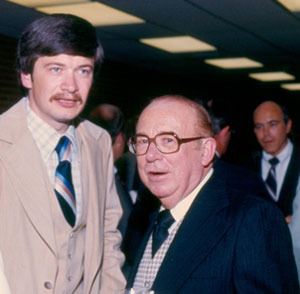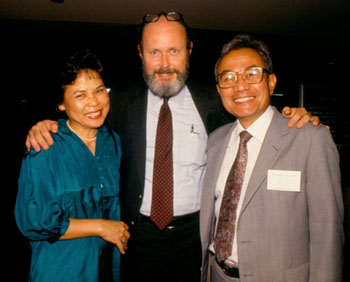Doctoral Program Celebrates 40th Anniversary
Oct. 12, 2010
SHSU Media Contact: Beth Kuhles

The brainchild of two visionary men—George J. Beto, former director of the Texas Department of Corrections, and Arleigh B. Templeton, former president of Sam Houston State College—was to establish a program of excellence in criminal justice education. Forty years later, the College of Criminal Justice has produced 259 doctoral graduates, including prominent leaders in academia and in practice across the Unites States and world.
“Over the years, the College of Criminal Justice at Sam Houston State University has produced quality doctorates that have worked across the State of Texas, the nation, and internationally,” said Michael Vaughn, assistant dean for graduate studies for the College of Criminal Justice and director of the doctoral program. “Sam Houston graduates serve on the boards and are office holders of key academic professional organizations in the discipline, including the Academy of Criminal Justice Sciences and the American Society of Criminology. Moreover, the teaching, research and scholarship conducted by Sam Houston students, alumni and faculty have made the world a better place.
“The 40th anniversary of our Ph.D. program is a time to honor the college as well as celebrate our graduates who have contributed so much to the academic discipline of criminal justice and criminology.”
In 1970, the then-Coordinating Board of Texas Colleges and University System approved the doctoral program at Sam Houston State University, one of the first criminal justice Ph.D. programs in the nation. It was an extension of the master’s degree programs in criminal justice and behavioral sciences in the Institute of Contemporary Corrections and Behavioral Sciences, the previous name of the College of Criminal Justice.
“We are gratified to have the approval of the degree in criminal justice since it constitutes the final step in the process of the institution in its development of a strong educational curriculum in criminal justice from the basic masters to the doctoral level,” George Killinger, then-director of the institute, said in a 1970 Huntsville Item article. “We are especially grateful to be the first university in the national to offer the professional doctorate in criminal justice.”
During the first year of the program, only five students were admitted. In 1973, Randall P. McCauley and Ronald J. Waldren became the first to earn the prestigious degree.
 |
| CJ faculty member Jerry Dowling (left) and then-Dean George Killinger in 1977. |
“The conferring of these degrees to these outstanding candidates is the crowning glory of the program in criminal justice at Sam Houston,” Killinger said at the time of the 1973 commencement ceremony.
Since that time, many more have passed through the doors of the College of Criminal Justice and contributed what they learned in Huntsville to the field far and wide.
The college’s influences can be seen on college campuses, in prominent publications, in organizational leadership, in local, state and federal agencies and in the military.
“In virtually every issue of every major journal in criminal justice, you will almost always find the college’s graduates,” said David L. Carter, an alumnus of the doctoral program and professor at Michigan State University’s School of Criminal Justice. “They are prolific in public research. They have had a tremendous influence in ACJS and ASC and had a number of presidents and officers, probably more than any other college or university.
“There is a phenomenal network of graduates with a common and magnificent bond. You have people coming into Huntsville from all over the world.”
Carter came to Sam Houston in the summer of 1977, earning his Ph.D. in 1980. During that time, Sam Houston State University was one of the only colleges offering a doctorate in criminal justice and had a good reputation. Living in McAllen, it also offered affordable in-state tuition, Carter recalled.
“The faculty were all involved on a national level with research and publication,” Carter said. “But it wasn’t just enough to be well-rounded in academics. You can’t be isolated in theory. It focused on real world problems and was very much involved in policy.”
Carter said the college provided him with lifelong friends.
“Life is richer when with the things you do professionally, you know you have friends you can rely on,” said Carter. “What I learned at Sam has influenced me throughout my career.”
Timothy N. Oettmeier, an executive assistant chief at the Houston Police Department, said the college helped him bridge the gap between the academic and practitioner’s world, making him a better thinker and decision maker.
 |
| CJ faculty members Charles Friel (center) and Rolando del Carmen, wth del Carmen's wife Josefa in 1986. |
“It has helped extraordinarily in my job,” said Oettmeier, who earned his doctorate in 1982. “It creates a process where you listen and make sure you have a complete picture of all the facts, critically analyze the issue, ask questions, weigh the information and go forward with a recommendation. The best thing about graduate work is that professor teaches you how to think differently. You see issues on a broader scale.”
Oettmeier said he especially likes the college’s partnerships with law enforcement and corrections through the Bill Blackwood Law Enforcement Management Institute of Texas and the Correctional Management Institute of Texas. The Houston Police Department and the college also are working together on several projects with community surveys and intensive patrols.
“Locally, they provide valuable resources for police agencies and correctional agencies,” Oettmeier said. “We are so lucky to have programs of that stature and magnitude.”
During the 1990s, Jeffery T. Walker, professor and graduate coordinator at the University of Arkansas at Little Rock, remembers the endless discussion and academic argument in “The Dungeon,” the basement of the Criminal Justice Center where doctoral students’ offices are located, or at Mazzio’s pizzeria, where Friday lunches were served. He authored his first book with Rolando del Carmen, Distinguished Professor of criminal justice and Texas State University System Regents’ Professor, before he even left the college.
“What I remember most was the breadth of people that you could talk to,” said Walker. “ I felt like when I came out of there, I could teach anything.”
Bitna Kim did her undergraduate and graduate work in South Korea but came to Sam Houston in 2003 for her doctoral studies. She now teaches gender and race issues at Indiana University of Pennsylvania. She too remembers many a late night in “The Dungeon” with her fellow Ph.D. students preparing for the comprehensive exams as well as the mentorship she received from many faculty members.
“The college has more resources than other graduate and doctoral program,” Kim said. “It has excellent faculty. You learn about international issues. Even outside the United States, the college has a good reputation.”
As SHSU continues to produce the next generation of criminal justice Ph.D.s, it plans to celebrate its 40th year of doctoral education with a reception in March at the Academy of Criminal Justice Sciences conference in Toronto, Canada. All doctoral graduates are invited to attend.
- END -
This page maintained by SHSU's Communications Office
Director: Bruce Erickson
Assistant Director: Julia May
Writer: Jennifer Gauntt
Located in the 115 Administration Building
Telephone: 936.294.1836; Fax: 936.294.1834
Please send comments, corrections, news tips to Today@Sam.edu.

 SamWeb
SamWeb My Sam
My Sam E-mail
E-mail

